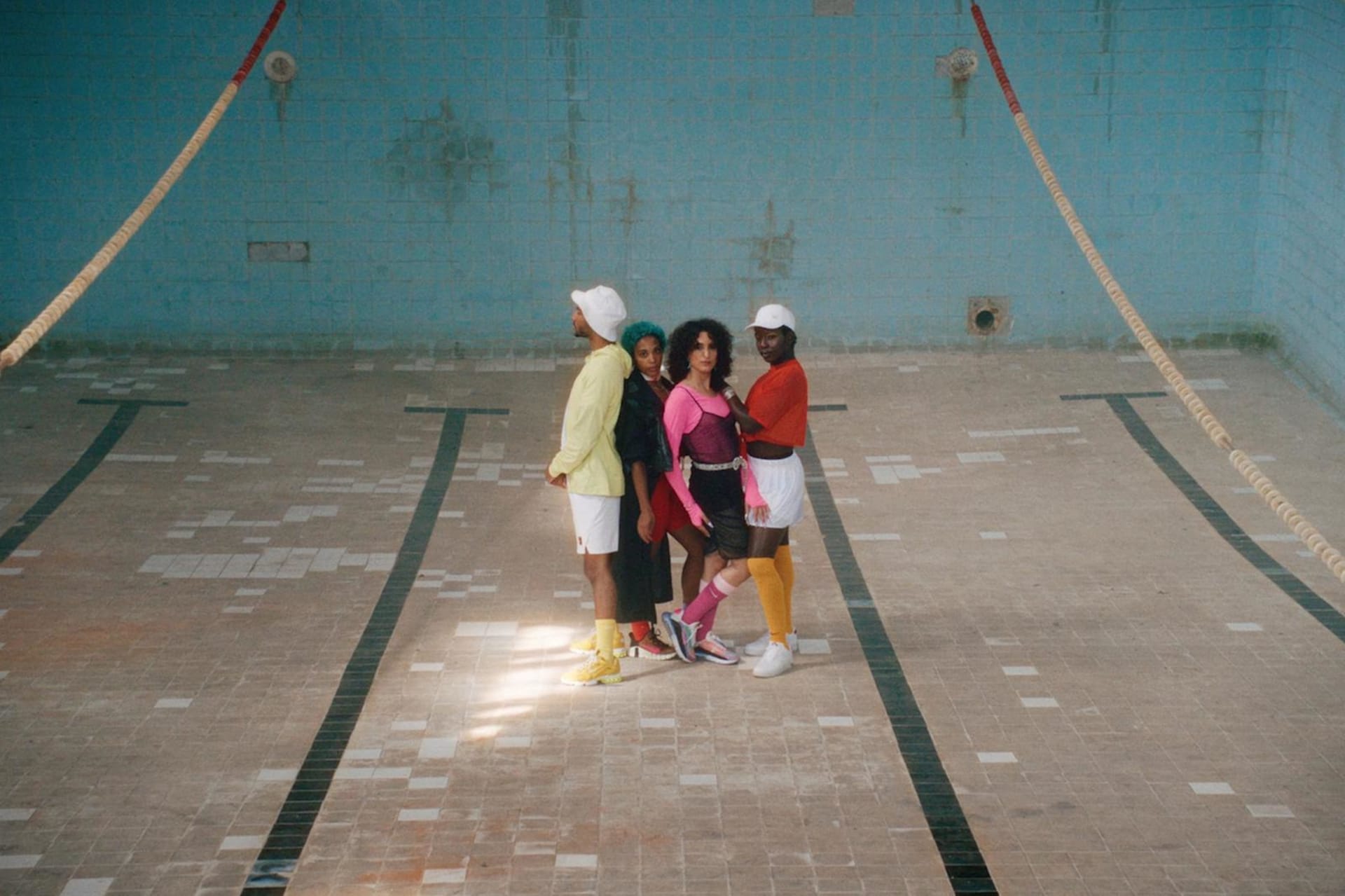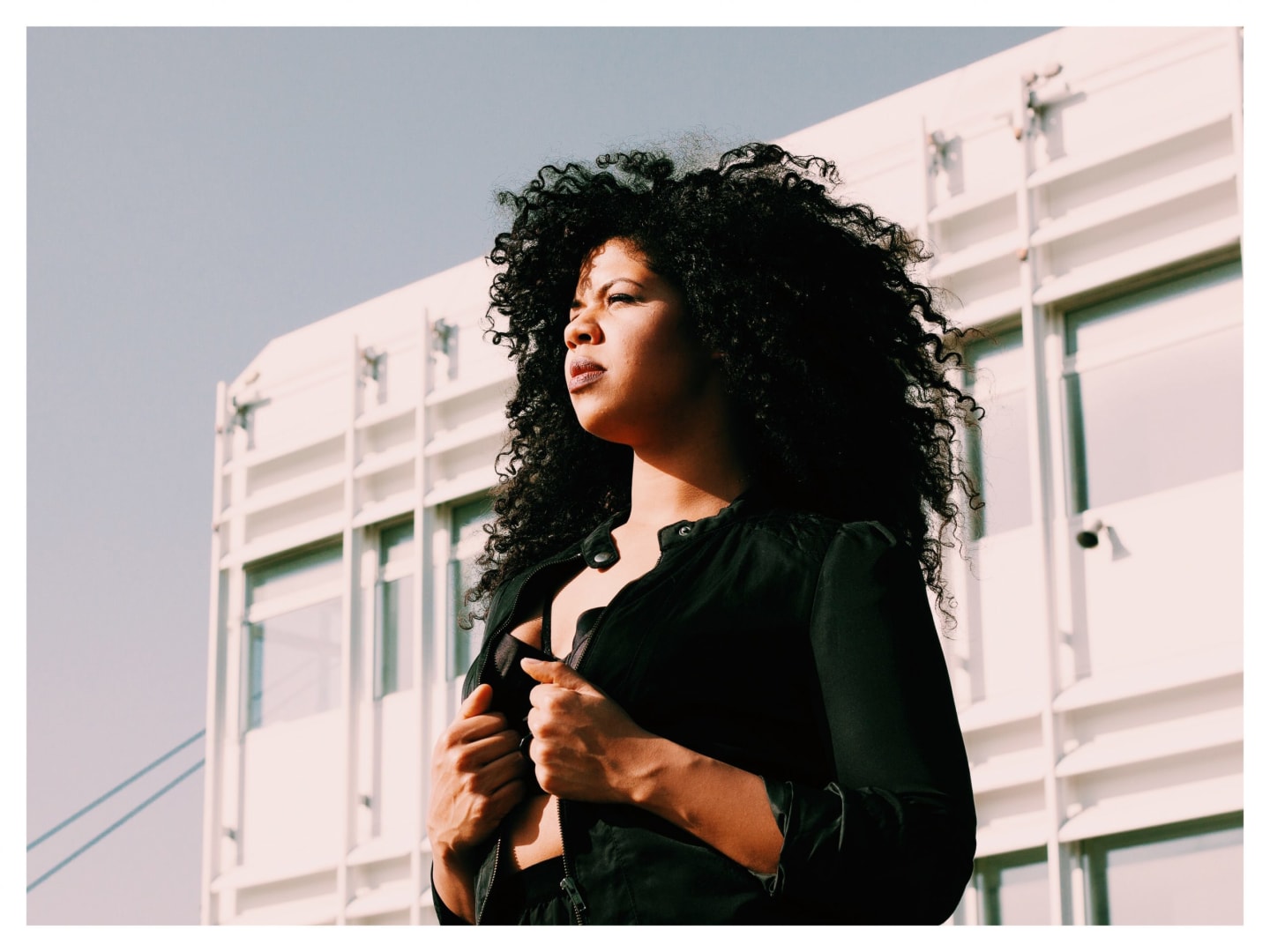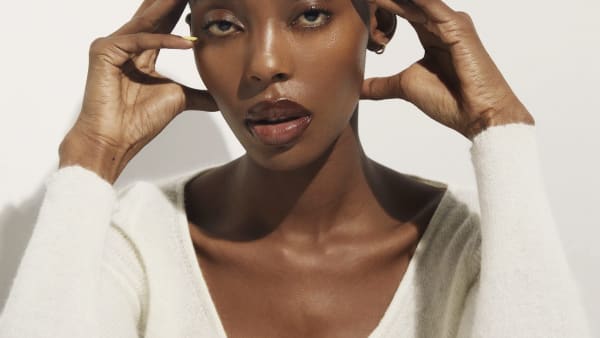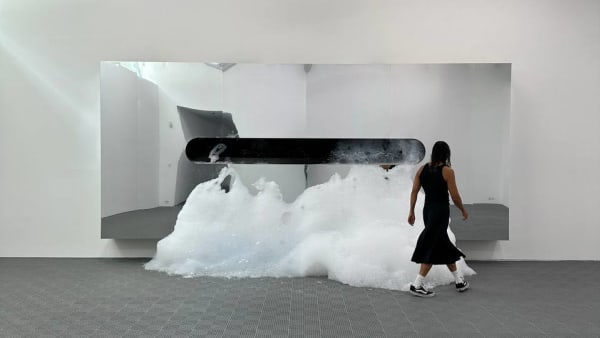

House of St. Laurent on Queer, Black Athleticism in the German Ballroom Community
“When I was young the athletes I saw were all skinny, white, and blond. Already these days, that’s changing,” says Düsseldorf-based performer Zoe, on the recent collaboration with Nike's BeTrue campaign.
Over the past decade, Ballroom culture has exploded from a niche scene, mostly based in the United States, to a veritable global phenomenon.
Voguing, balls, categories, Houses—at one point in the recent past, these terms would have seemed completely foreign outside of the predominantly Black and LGBTQIA+ community who used them. Now, they seem almost ubiquitous in pop culture, with Voguing (i.e. the elegant form of competitive dance that forms the core of Ballroom) serving as a creative anchor for young queer people the world over. Germany is no different: when Ballroom made it to its shores in the 2010s, the movement quickly took root, and now Germany is home to some of Europe’s best and most celebrated vogue Houses (for the uninitiated, a House is like a family of vogue performers and Ballroom participants to compete together like a dance team—but more on that later).
Indisputably, the rise of voguing and Ballroom in Germany can be accredited to one woman: Georgina AKA Mother Leo St Laurent, the mother of the European chapter of the iconic House of St Laurent, one of the original New York Houses that brought Voguing to the forefront of the city’s nightlife culture in the early 1980s. Before her current status as House mother, Georgina was the founder and mother of the House of Melody, Germany’s very first Voguing House. “I started the House because I felt very lonely Voguing here by myself,” she explains matter-of-factly. We’re catching up with Georgina over Zoom from her apartment in Berlin on a bright November afternoon, and she’s both extremely relaxed and all smiles. She’s joined by another member of the House of St Laurent: LaQuéfa St Laurent, who recently relocated from Berlin to Leipzig to continue his work teaching and performing Vogue as a solo agent (known as a 007), and Dusseldorf-based Zoe, a former member of the House of Melody who now advances the West-German Voguing scene.



There was nothing happening in Germany, so we were trying our best to make it happen, but at the same time, there was still a lot of learning in that process.
“I traveled to New York every year between 2008 and 2012, so I was very fortunate to get to know that community,” Georgina continues, and I got in touch with Archie Burnett who was everybody’s mentor in Europe, you could say. How I found Zoe and the other founding members is that I knew Archie taught a few workshops in Dusseldorf, which is also my hometown, before I moved to Berlin.” Georgina began recruiting members to form a House from there, and suddenly she was teaching workshops herself, as well as performing and generally spreading the message around Germany’s queer Black community. “This journey really started by being fascinated by this culture, wanting to know more, and at the same time acting and doing,” she explains. “There was nothing happening in Germany, so we were trying our best to make it happen, but at the same time, there was still a lot of learning in that process.”
Before LaQuéfa joined the House of St Laurent in Berlin, Georgina and Zoe came from the hip-hop dance scene in Dusseldorf, but Vogue gave them an outlet to express their identities that they had never experienced up to that point. “For me, the challenge for that first generation was that we really came to it from the perspective of a dancer,” says Zoe. She’s talkative and lively, and her big halo of curly hair bounces as she speaks. “We were very attracted to the voguing dance style, like, ‘Oh my goodness, I feel so feminine, I can do this and feel beautiful.’ Georgina and I came from the so-called urban dance community, but voguing gave us a more feminine approach to a battle dance style.” When she discovered that the Ballroom scene was uplifting Black and queer performers, she knew she had found her home. LaQuéfa chimes in: “It was the same for me. I grew up in a really straight home. I grew up with my mother in Angola, and then moved to Germany. I used to be straight, and I had a lot of girlfriends, and then I saw Georgina and I was like ‘Oh my God, she is amazing!’ She was like my inner voice. She was doing what I wanted to be doing, I was doing hip hop and breakdance, then I tried to Vogue but I didn’t experience it as it should be because there were a lot white cis women, and they were all so good because they used to be professional dancers. But slowly, more POC started to come to balls and events, and that’s how the movement actually grew.”
This element will show content from various video platforms.
If you load this Content, you accept cookies from external Media.
Georgina, Zoe and LaQuéfa have all found more than just performance through Ballroom–they’ve found their home, their tribe, the place they can be themselves. Recently, House of St Laurent starred in BeTrue film “Team Reimagined” that showcased their ethos as a collective and, together with Zoe, participated in the workshop BeTrue Lab, where they were able to share their knowledge with other queer-focused groups with the common goal of making the sports world more open to LGBTQIA+ experiences.
“Nike has been really crucial because there’s not a lot of brands outside that really support queerness or Blackness,” explains Georgina. “It’s really great to have this brand behind you as a force, saying this is important, and we’re going to talk about this. I was so proud of LaQuéfa when he was part of the BeTrue collection campaign last year [2019], hanging out at Kurfürstendamm looking fierce. It was just so amazing to see that.” In the current campaign, the House wears colorful clothing, weave and swirl around each other, their moves mirroring both a fashion runway and an interpretive dance performance. “When I was asked to work with Nike, I was like, ‘Oh my God, I can work with something bigger here,” says LaQuéfa excitedly, “But I was on the fence at first. It was like, ‘OK is this just for the moment because queerness is now a trend, or are they in it for the long haul? Now, I’m really happy that we did this campaign, to show our community and show our love. It made me excited to look forward to the future.”
Zoe’s experience mirrored LaQuéfa’s. With the explosion of Vogue in Germany, she wanted to make sure Nike were in it for the right reasons. “I was hesitant because when it comes to commercial brands, it’s like, how pure are your intentions? Are you coming from a place of integrity? But I feel like from what I’ve experienced from Nike, they are coming from a real place of deep interest in really changing something at the root. I was able to speak very honestly about my concerns, and they still continued to be like, ‘OK, well we still want to work with you because we want to change, and we are open to feedback and conversation, because we want to be authentic allies.”

Initiatives like BeTrue have proven incredibly effective in connecting members of diverse communities who may not have even heard of each other, allowing them to flourish with the support of a major brand. “When we did the BeTrue Lab, it really gave a chance to know about other great organizations,” says Georgina. Other Berlin-based groups like Seitenwechsel, the sports club for trans*, inter* and queer femmes, and Wavy Run Kollektiv, a running club that centers BIPOC, WOC, LGBTQI* and underrepresented voices, also appear in the BeTrue spot, and were able to link up with House of St Laurent around the issues that inspire them. “After that campaign, we did another collaboration with the Wavy Run Collective, they did a fundraising anti-racism run where we then talked about our experience with Ballroom. It was helpful to meet people and figure out who was doing what in Berlin. We all had very similar points, no matter if we did sports or Voguing or football or whatever it may be. I’m really excited to see how this is going to continue.”
“I think also because Nike is a commercial brand, it’s really about visibility and representation,” Zoe says with a hint of seriousness. “Sports brands have such an impact on the youth, you know? I think it’s their responsibility to own that power they have, especially when it comes to presenting a diverse range of bodies. When I was young the athletes I saw were all skinny, white, and blond. Already these days, that’s changing. Now when people see us in these commercials, they’ll think, ’I can be that too.’” “I have to be honest, I don’t do this for money,” adds LaQuéfa. “I do this so other people can see me.”
Like with most performance scenes, Germany’s Ballroom community has had to pause for a while due to the Covid-19 pandemic, but they continue to evolve. “I feel like before corona, there was really an overflow in the scene: too many balls, too much shade, and too many discussions through the internet that would have normally happened face to face in a safe space,” says Georgina. “I felt like there was a danger for Ballroom to really destroy itself because things were getting more focused on the fame and the status.” Once the performances can begin again, though, Zoe is optimistic about the future of German Ballroom. “The past three or four years have really shown that you can make a career out of Ballroom, and not just one specific prodigy person, but anyone who has discipline and focus and knows what they want.” And if one thing is for certain, the pioneers are here to stay, whether it be from Berlin, Dusseldorf, Leipzig, and beyond. “We took Voguing culture, we accepted the culture, we know the culture, and we made something out of it here,” says LaQuéfa humbly. “I’m saying: I’m here, I’m queer, you have to accept me.”
Cameron Cook is a writer based in Berlin. Follow him on Twitter.
Published November 25, 2020. Words by Cameron Cook.






Follow @electronicbeats